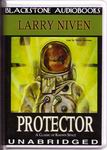

 The Reel Stuff
The Reel Stuff
Edited by Brian Thomsen and Martin H. Greenberg
Read by Various
6 Cassettes – 9 Hours [UNABRIDGED]
ISBN: 0886465745
Publisher: dhAudio
Published: 2000 [OUT OF PRINT]
Themes: / Science Fiction / Horror / Computers / Memory / Aliens / Urban Legend / Space Travel / Time Travel /
The Reel Stuff is a collection of stories that have been adapted into films. They are all great stories, and this collection has the added attraction of comparing these stories to the films. dhAudio really did a fabulous job with this one. The stories:
Johnny Mnemonic by William Gibson, read by Christopher Graybill
FILM: Johnny Mnemonic (1995)
Johnny Mnemonic was published in 1981, a few years before Gibson’s Hugo and Nebula-award winning Neuromancer hit the scene, illuminating the whole Cyberpunk sub-genre. This story is a clear view of that sub-genre as it has all the elements; human/computer interfaces, plenty of violence, and quick-witted characters. In this story, the title character holds a piece of data in his brain that is wanted by some powerful folks who are willing to do plenty to get it. Christopher Graybill does a great job with it.
Amanda and the Alien by Robert Silverberg, read by Colleen Delany
FILM: Amanda and the Alien (1995 – TV)
This tale, by the great Robert Silverberg, is humourous and sexy. The main character is a ditzy teenage girl named Amanda who takes an alien who can morph into anyone it eats under her wing. Definitely a B-movie kind of story, but purposefully so. Colleen Delany performs well, capturing the Amanda character perfectly.
Mimic by Donald A. Wollheim, read by Terence Aselford
FILM: Mimic (1997)
Mimic is a very short tale that reads almost like a documentary about the peculiar ways in which animals hide from other animals. This is then extrapolated in a very spooky way to humans. Terence Aselford didn’t have a heck of a lot to work with here, but he kept it interesting.
The Forbidden by Clive Barker, read by Vanessa Maroney
FILM: Candyman (1992)
Clive Barker drums up some modern mythology here as a female professor explores urban legend among the lower class in London. The story is effective and chilling in the hands of Vanessa Maroney, who navigates Barker’s weirdness as if it were really happening.
We Can Remember It For You Wholesale by Philip K. Dick, read by Terence Aselford
FILM: Total Recall (1990)
Terence Aselford gets another chance in this collection, reading this reality-bender by Philip K. Dick. The main character wants to go to Mars in the worst way, but can’t afford it. The solution? Take a virtual vacation! Have memories implanted so you can “have gone” to Mars. But here, things get complicated when the implantee’s supressed memories surface during the procedure. Dick again manages to leave me wondering what the heck is really real – where exactly is the immovable bedrock? Nothing is sacred in Philip K. Dick’s hands.
Nightflyers by George R.R. Martin, read by Christopher Graybill
FILM: Nightflyers (1987)
Martin here spins a science fiction horror story. Think Psycho meets Lost in Space and maybe you’ll have a feel… a group of people ride on a ship that is controlled by a mystery man who never leaves the cockpit. Christopher Graybill again is impressive in his reading.
Air Raid John Varley, read by Nannette Savard
FILM: Millenium (1989)
Nannette Savard reads a very strange, very affecting story about Earth’s future. In it, humans have evolved just a bit, but the Earth’s biosphere has been destroyed, its people diseased. Varley’s descriptions are vivid and graphic – these people are in a bad way. To keep the species going, they go back in time to retrieve healthy airline passengers, mid-flight, since history shows they are on the verge of fiery death. These passengers become humanity’s hope. Varley is a very affecting writer, and through the main character we experience much. Savard does a great job conveying this to the listener.
Sandkings by George R.R. Martin, read by Richard Rohan
FILM: The Outer Limits: Sandkings (1995)
Simon Kress wants a pet, but something interesting… something out of the ordinary. He finds what he’s looking for when he purchases a group or creatures called sandkings which live in a large terrarium with plenty of sand lining the bottom. They build castles and fight battles. They even worship. And they are endlessly fascinating. Well, they were. Perhaps a little prodding from Kress will end the monotony… This one is my favorite of this excellent collection. Sandkings is original and fascinating, both as a character study of a man with too much comfort and as an exploration of an alien animal species.
Posted by Scott D. Danielson



 Ender’s Game
Ender’s Game Startide Rising
Startide Rising Ender’s Game
Ender’s Game Speaker for the Dead
Speaker for the Dead